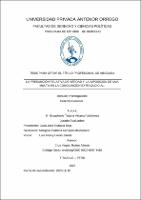La presunción relativa de verdad y la imposición de una multa en la conciliación extrajudicial

Fecha
2023Autor(es)
Velasco Valdiviezo, Estephanie Tatiana
Metadatos
Mostrar el registro completo del ítemResumen
Nuestra tesis se titula: La presunción relativa de verdad y la imposición de una multa en la conciliación extrajudicial; y, en ella nos planteamos la siguiente pregunta: ¿Por qué se debe derogar la presunción relativa de verdad y la
imposición de una multa, prescritas en la parte final del artículo 15 de la Ley
N° 26872, ley de conciliación?
En nuestra investigación nos planteamos el siguiente objetivo general: “Dar a conocer por qué se debe derogar la presunción relativa de verdad y la
imposición de una multa, prescritas en la parte final del artículo 15 de la Ley
N° 26872, ley de conciliación”; y, también los siguientes objetivos específicos:
Analizar la naturaleza jurídica de la conciliación extrajudicial como mecanismo de solución de conflictos en el Perú; estudiar la presunción relativa de verdad como consecuencia del comportamiento inactivo de la parte invitada a conciliar y del demandado en el ordenamiento peruano; proponer la derogación de la parte final del artículo 15 de la Ley N° 26872, ley de conciliación que regula la conciliación extrajudicial.
Finalmente arribamos a la siguiente conclusión principal: “La presunción relativa de verdad y la imposición de una multa, prescritas en la parte final del artículo 15 de la Ley N° 26872, ley de conciliación, deben ser derogadas, ya que dicha presunción queda prácticamente suprimida una vez que, dentro del proceso civil, el demandado contesta la demanda; ya que aquí la norma especial que rige el proceso Civil es el Código Procesal Civil; o, en todo caso, cuando dicho demandado no conteste la demanda dentro del plazo de ley y
por ende sea declarado rebelde, entrará a tallar, si cabe el caso, la presunción contenida en el artículo 461 del Código Procesal Civil, puesto que como ya se dijo es la norma especial; por lo que aquella presunción relativa de verdad quedaría absolutamente absorbida por lo regulado en nuestro Código Civil adjetivo”. Our thesis is entitled: The relative presumption of truth and the imposition of a fine in extrajudicial conciliation; and, in it we ask ourselves the following question: Why should the relative presumption of truth and the imposition of a fine, prescribed in the final part of article 15 of Law No. 26872, conciliation law, be repealed?
In our research we set ourselves the following general objective: ““To make known why the relative presumption of truth and the imposition of a fine,
prescribed in the final part of article 15 of Law No. 26872, conciliation law, must be repealed;““ and also the following specific objectives: Analyze the legal nature of extrajudicial conciliation as a conflict resolution mechanism in Peru;
study the relative presumption of truth as a consequence of the inactive behavior of the party invited to conciliate and the defendant in the Peruvian legal system; propose the repeal of the final part of article 15 of Law No. 26872, conciliation law that regulates extrajudicial conciliation.
Finally we arrive at the following main conclusion: ““The relative presumption of truth and the imposition of a fine, prescribed in the final part of article 15 of Law No. 26872, conciliation law, must be repealed, since said presumption is practically suppressed once, within the civil process, the defendant answers
the claim; since here the special norm that governs the Civil process is the Civil Procedure Code; or, in any case, when said defendant does not answer the claim within the legal term and is therefore declared a rebel, the presumption contained in article 461 of the Civil Procedure Code will enter into consideration, if applicable, since as already it was said it is the special norm; so that relative presumption of truth would be absolutely absorbed by what is
regulated in our adjective Civil Code”.
Palabras clave
Colecciones
- Derecho [477]

